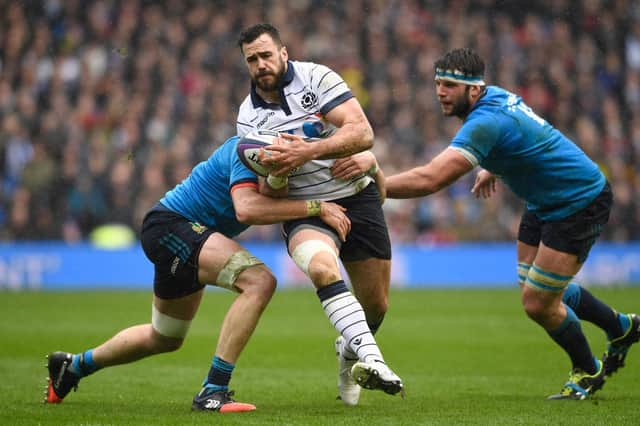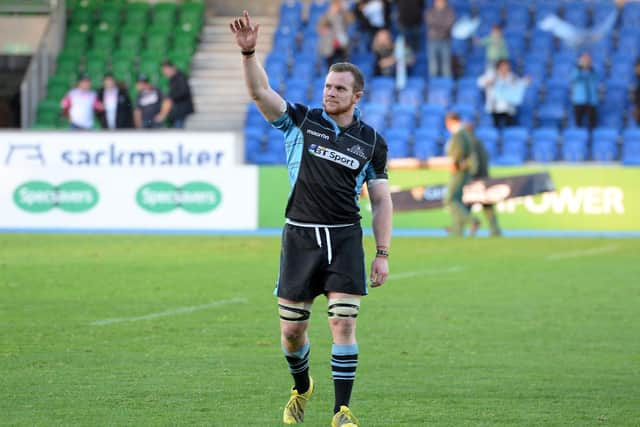Alex Dunbar was a centre in the New Zealand mould - powerful, skilful and deceptively fast


He was raw of course, but with people like John Rutherford, Rodney Pow and Graham Marshall on hand to offer advice, he matured quickly and was soon ready for the professional game. Now, after too many injuries, he has announced his retirement at what is now the comparatively early age of 31.
Glasgow Warriors came calling. He made his mark quickly and won his first Scotland cap against Samoa in a summer four-nations tournament in South Africa. He scored a try against the host country in the next match and his centre partnership with the equally young Matt Scott looked the best Scotland had had for years. He shone for Glasgow in their rise to the top of what was then the Pro12, and there was arguably no club in Britain or Ireland that had a more talented and exciting three-quarter than Glasgow’s: Tommy Seymour, Mark Bennett, Alex Dunbar DTH van der Merwe. Add Stuart Hogg at 15 and Finn Russell at 10, and on their best days Glasgow played the sort of rugby we too often see only in dreams.
Advertisement
Hide AdAdvertisement
Hide AdHe was the bulwark in that back division, to my mind the ideal 12, powerful, skilful and deceptively fast, though for Glasgow he was often at 13 with Peter Horne at 12. Indeed I have a memory that at one point he was rated the fastest Scotland back over ten or 15 yards. It was a sad shame that a knee injury kept him out of the 2015 World Cup, for he was, one always thought, very much Vern Cotter’s kind of player, a centre in the New Zealand mould.


So now, he follows Tommy Seymour into retirement and, in his words, “it’s off with the rugby boots, on with the wellies”, as he returns to his first love, farming.
Chris Fusaro, another player I have always admired, has also called it a day, his last few seasons often marred by injuries. Even so, he has clocked up 183 matches for, Glasgow, behind only Rob Harley and Ryan Wilson of current players. I’m surprised that he didn’t get more Scotland caps, even while recognising that we haven’t been too badly served in the back-row. Some may have judged him on the small side for the game today, but he was tigerish at the breakdown, and quick in support of the ball carrier. His energy always seemed endless. I recall Iain Paxton, the great No 8 of our 1984 Grand Slam team, speaking admiringly of his fellow Fifer as “a perpetual motion man”. Fusaro came up through Bell Baxter High School in Cupar and Howe of Fife alongside Peter Horne. I suppose they’ve played together for 20 years, quite a record.
As we say “farewell” to some, we look forward to the coming crop. It’s good news that the Under-20 Six Nations will go ahead next month. Sensibly, to avoid travel except when this is necessary, all the matches will be played in Cardiff between June 19 and July 13. Normally, of course, they are played on Six Nations weekends, usually on the Friday evening, and, understandably, don’t not always attract as much attention as they deserve. They should get more this year. Scotland play Ireland in the first match, and all games will be broadcast either on terrestrial TV or streaming channels.
If the past 14 or 15 months have been trying for all of us, they will surely have been very frustrating for young people on the brink of a career in sport. Careers at the top – in the pro-game – may be longer than they used to be; even so, to have endured a season without being able to play matches must have been difficult.
Sean Lineen has announced a squad of 41 players, only half-a-dozen or so attached to clubs in England. There are a few familiar rugby names among them, but one would rather not dwell on these; there’s enough pressure on youngsters without inviting the question: will this chap be as good as his father, uncle, elder brother or grandfather?
Match day squads will, at 26, be even larger than usual. No doubt there are good reasons for this, but waves of replacements usually make for messy second halves or the last 20 minutes. All Scotland’s matches are seemingly to be played at Cardiff Arms Park. In the old days the Arms Park was often a quagmire in wet weather, but things are, I think, different now. In any case it may have stopped raining by mid-June. Perhaps.
A message from the Editor:
Thank you for reading this article. We're more reliant on your support than ever as the shift in consumer habits brought about by Coronavirus impacts our advertisers.
If you haven't already, please consider supporting our trusted, fact-checked journalism by taking out a digital subscription
Comments
Want to join the conversation? Please or to comment on this article.
